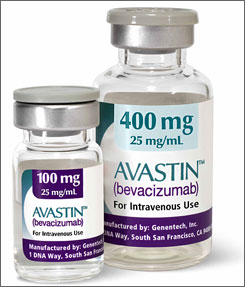The Fight Over Avastin
 On June 29, 2011, a panel of the Food and Drug Administration rejected the drug Avastin for use in the treatment of end-stage breast cancer. Manufactured by Genentech, a subsidiary of Roche, the drug has been approved for the treatment of other types of cancer, but as recently reported by NBC Nightly News, the panel believed that the drug is not effective, and the side effects too serious, for the treatment of breast cancer. A final decision will come from the FDA in a few months.
On June 29, 2011, a panel of the Food and Drug Administration rejected the drug Avastin for use in the treatment of end-stage breast cancer. Manufactured by Genentech, a subsidiary of Roche, the drug has been approved for the treatment of other types of cancer, but as recently reported by NBC Nightly News, the panel believed that the drug is not effective, and the side effects too serious, for the treatment of breast cancer. A final decision will come from the FDA in a few months.
As can be imagined, this action has brought a firestorm of criticism of the FDA. Because the drug will still be on the market, it will be possible, perhaps, for doctors to prescribe the drug “off-label” for breast cancer, but of course, insurance companies won’t pay for it if it’s not approved for the specific disease for which it is prescribed.
But, as FiercePharma reports, it appears that Avastin will not be dropped from Medicare coverage, no matter what the FDA decides down the road, and the decision could have grave consequences for the FDA down the road:
Indeed, House Republicans are promising to make Avastin an issue during next week’s hearings on the reauthorization of FDA’s user-fee funding provisions. House Energy and Commerce Committee Chairman Fred Upton says he has “grave” concerns about FDA’s review of the data on Avastin, the Wall Street Journal reports, and aides are saying that either he or another member will raise those concerns at Thursday’s hearing.
Read the referenced Wall Street Journal article here. Stay tuned. If indeed the full FDA precludes usage of Avastin for the treatment of breast cancer, it will present many questions for the manufacturer, which will undoubtedly know that doctors may still be prescribing it for use as a treatment for the disease. Of course, manufacturers of all sorts of drugs know that their medication is prescribed off-label, but this will be a much higher profile case than most. Will that knowledge hurt the manufacturer if any defects are alleged? We will have to wait and see. Preemption is always a good argument in drug cases, but what preemption would there be if the FDA did not approve the drug for use for this particular disease?















Pingback: FDA Faces Heavy Criticism Over Avadin Decision